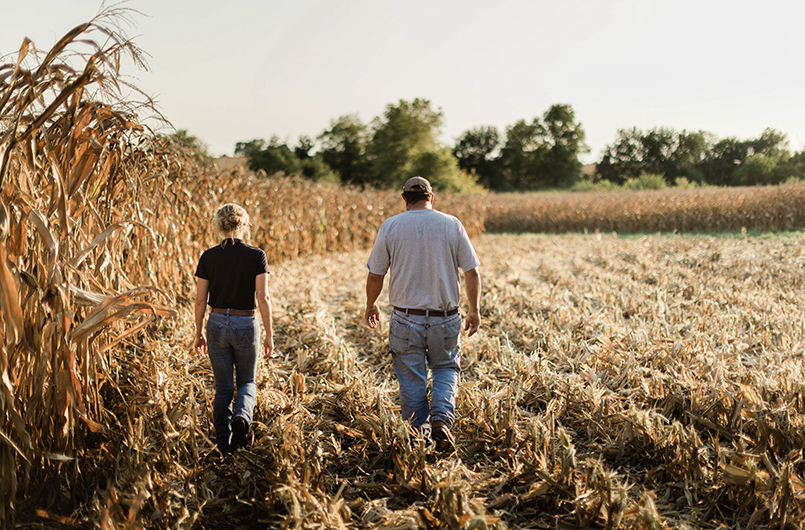
by Drew Slattery
Many farmers and ranchers across America are facing mounting pressures, including volatile markets, extreme weather, rising operational costs, generational transitions, dwindling public support, and understanding scope 3. As companies engage with their agriculture supply chains through sustainability projects, it is critical to support producers to address these challenges head on, rather than adding new burdens. Embedding producer resilience into sustainability project design isn’t just beneficial, it’s essential.
When producers thrive, supply chains gain:
- Reliable and secure sourcing
- Reduced risk from price fluctuations
- Enhanced stakeholder trust and credibility
- Global competitiveness
- Predictable delivery of environmental outcomes, including carbon reduction and co-benefits—all essential to Scope 3 success
Why Many Sustainability Programs Miss the Mark
Value chain initiatives often fall short because they prioritize corporate objectives and frameworks over on-the-ground production realities.
Excessive administrative requirements, complex data protocols, and impractical practice recommendations deter producer participation. Poorly structured benefit-sharing incentives may even demotivate producers from engaging at all. Once trust is lost, future programs struggle to gain traction before they begin.
Programs weighed down by unrealistic expectations, misaligned incentives, and practices that do not directly create economic, productivity, or efficiency wins often lead to low adoption and limited outcomes. That’s why trust – and the design decisions that shape it – matters so much.
Designing Programs Producers Will Embrace
Effective initiatives start with authentic collaboration. Bringing producers into the design process from the beginning reveals critical insights about operational challenges, financial constraints, and practical limitations. The most successful programs are:
- Operationally Compatible: Aligned with current practices and beneficial to the operation long-term
- Financially Attractive: Offering clear, near-term benefit sharing agreements
- Scalable: Flexible enough to be adopted across diverse farm and ranch operations.
To realize the full value of sustainable supply chain and Scope 3 investments, companies must prioritize producer-centric design. Partnering with farmers and ranchers as co-creators, not just participants, leads to more feasible, impactful, and resilient programs.
Case Study: A Look at Data Demands
We recently worked with a food and beverage client to streamline data collection in a Scope 3 project. Our corporate sustainability technical team knew which data points were most important and which were not needed to support the project’s alignment with various corporate sustainability and reporting protocols. By bridging internal corporate sustainability expertise with producer-centric approaches, we reduced the producer’s expected time commitment for data capture from 2.5 hours to just 15 minutes.
AgSpire’s unique blend of internal end-to-end value chain expertise allowed the team to develop a project that met key corporate reporting needs while also aligning with producer priorities, ultimately enhancing both data quality and operational efficiency.
In a complementary approach, we identified opportunities to apply existing industry averages while maintaining alignment with key corporate reporting standards to lighten the producer data burden and enhance program scalability. These practical shifts made participation significantly more feasible, without compromising program integrity.

AgSpire’s Producer-Centric Approach
At AgSpire, we bridge corporate sustainability goals with real-world agricultural implementation. Our team combines deep agricultural expertise with cutting-edge sustainability strategies to develop programs that are practical and impactful, measurable, and scalable:
- Outcome-Oriented Strategies: Measurable results aligned with business needs and sustainability priorities
- Collaborative Program Design: Grounded in producer input and practical application
- Comprehensive Implementation: Technical assistance, simplified data collection, and full-service project support drive adoption and results
- Business Case for Change: Practices, financial incentives, and increased global competitiveness that create program durability.
The Path Forward
True resilience is built on trust, collaboration, and practical solutions rooted in the realities of agriculture. Companies that invest in producer-centered resilience strategies strengthen their sustainability outcomes and take steps to future-proof their supply chains.
Ready to build resilience into your supply chain? AgSpire helps turn your ambitions into tangible, lasting outcomes. Connect with us to explore custom solutions designed for impact: e-mail | call/text (605) 675-7255
Additional Links
Want to learn more about how AgSpire promotes supply chain resilience >>> Productivity Based-Interventions
About the Author
DREW SLATTERY